外研版英语中考语言基础知识梳理与训练 第2课 七年级上册 Modules 1—5
文档属性
| 名称 | 外研版英语中考语言基础知识梳理与训练 第2课 七年级上册 Modules 1—5 | 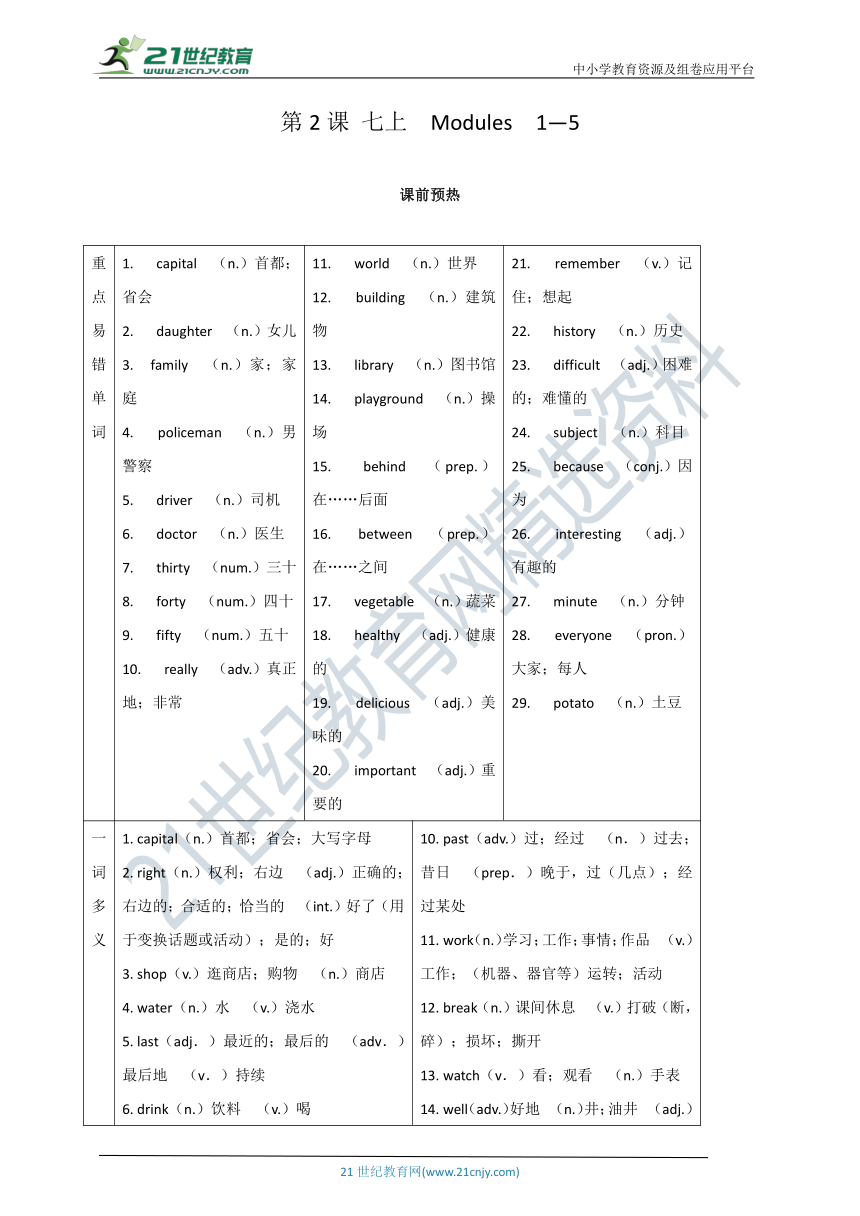 | |
| 格式 | doc | ||
| 文件大小 | 1.3MB | ||
| 资源类型 | 试卷 | ||
| 版本资源 | 外研版 | ||
| 科目 | 英语 | ||
| 更新时间 | 2022-02-05 08:46:01 | ||
图片预览

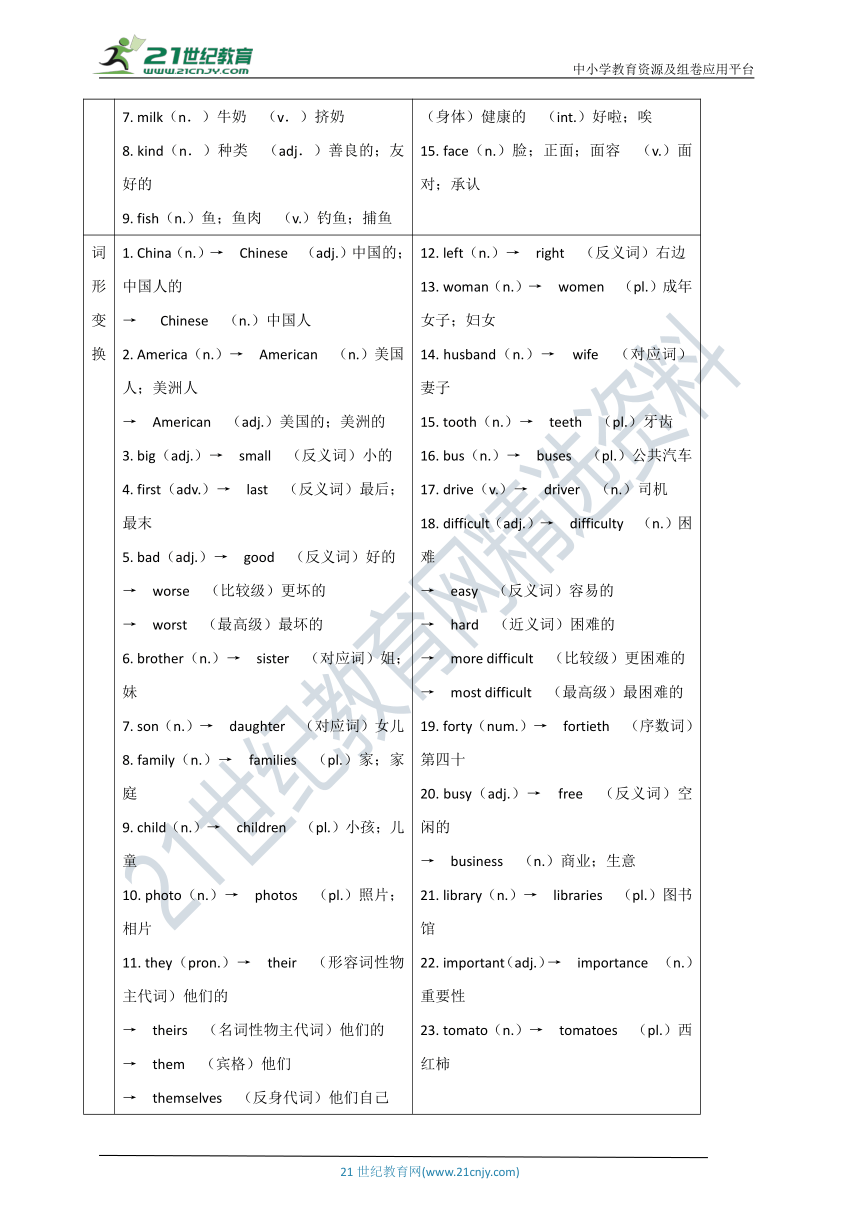
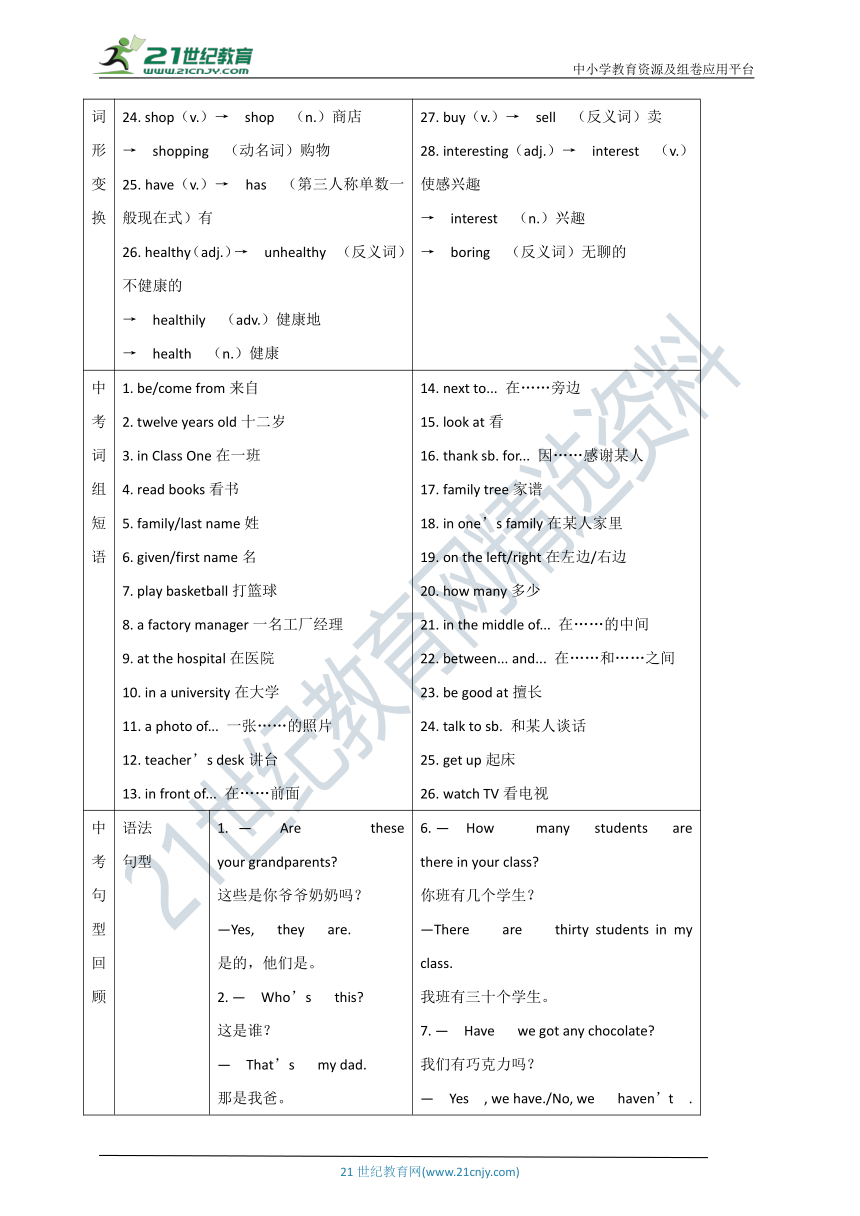
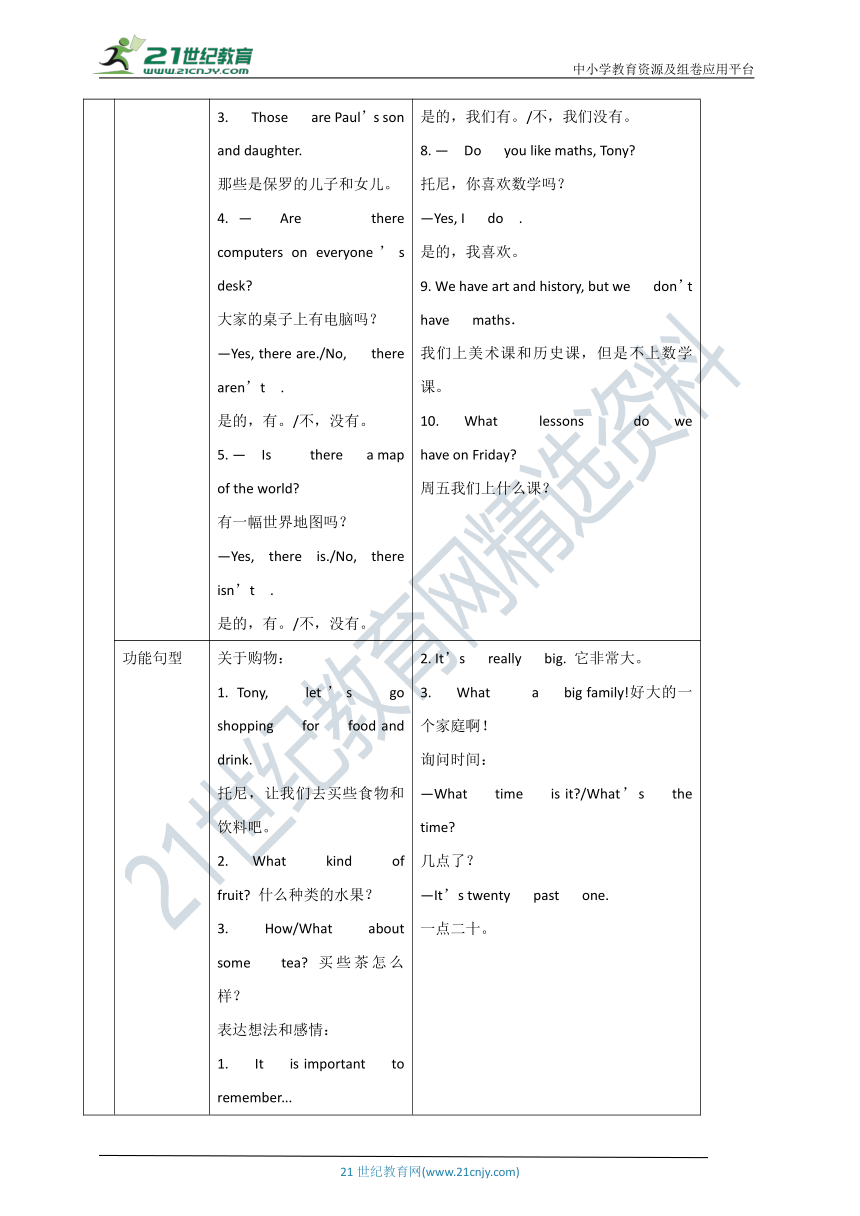
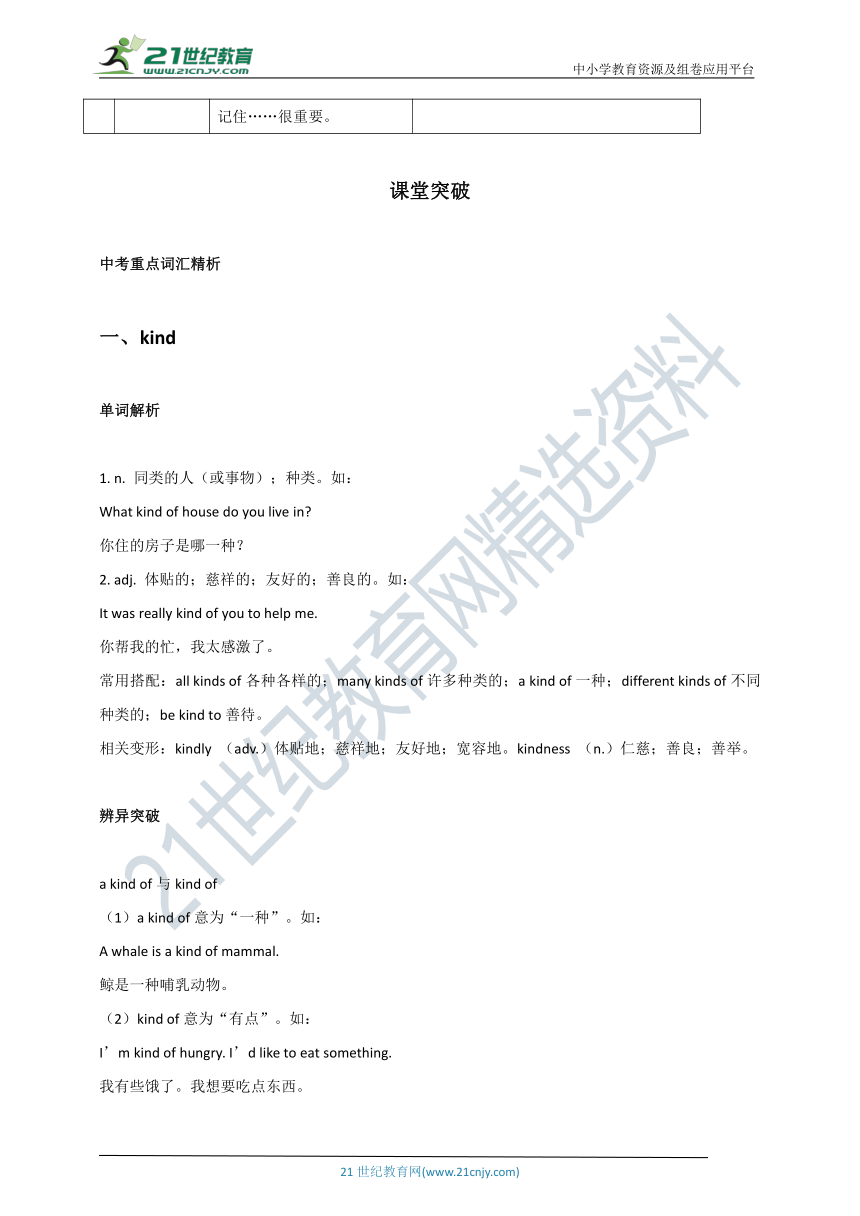
文档简介
中小学教育资源及组卷应用平台
七上 Modules 1—5
课前预热
重点易错单词 1. capital (n.)首都;省会2. daughter (n.)女儿3. family (n.)家;家庭4. policeman (n.)男警察5. driver (n.)司机6. doctor (n.)医生7. thirty (num.)三十8. forty (num.)四十9. fifty (num.)五十10. really (adv.)真正地;非常 11. world (n.)世界12. building (n.)建筑物13. library (n.)图书馆14. playground (n.)操场15. behind (prep.)在……后面16. between (prep.)在……之间17. vegetable (n.)蔬菜18. healthy (adj.)健康的19. delicious (adj.)美味的20. important (adj.)重要的 21. remember (v.)记住;想起22. history (n.)历史23. difficult (adj.)困难的;难懂的24. subject (n.)科目25. because (conj.)因为26. interesting (adj.)有趣的27. minute (n.)分钟28. everyone (pron.)大家;每人29. potato (n.)土豆
一词多义 1. capital(n.)首都;省会;大写字母2. right(n.)权利;右边 (adj.)正确的;右边的;合适的;恰当的 (int.)好了(用于变换话题或活动);是的;好3. shop(v.)逛商店;购物 (n.)商店4. water(n.)水 (v.)浇水5. last(adj.)最近的;最后的 (adv.)最后地 (v.)持续6. drink(n.)饮料 (v.)喝7. milk(n.)牛奶 (v.)挤奶8. kind(n.)种类 (adj.)善良的;友好的9. fish(n.)鱼;鱼肉 (v.)钓鱼;捕鱼 10. past(adv.)过;经过 (n.)过去;昔日 (prep.)晚于,过(几点);经过某处11. work(n.)学习;工作;事情;作品 (v.)工作;(机器、器官等)运转;活动12. break(n.)课间休息 (v.)打破(断,碎);损坏;撕开13. watch(v.)看;观看 (n.)手表14. well(adv.)好地 (n.)井;油井 (adj.)(身体)健康的 (int.)好啦;唉15. face(n.)脸;正面;面容 (v.)面对;承认
词形变换 1. China(n.)→ Chinese (adj.)中国的;中国人的→ Chinese (n.)中国人2. America(n.)→ American (n.)美国人;美洲人→ American (adj.)美国的;美洲的3. big(adj.)→ small (反义词)小的4. first(adv.)→ last (反义词)最后;最末5. bad(adj.)→ good (反义词)好的→ worse (比较级)更坏的→ worst (最高级)最坏的6. brother(n.)→ sister (对应词)姐;妹7. son(n.)→ daughter (对应词)女儿8. family(n.)→ families (pl.)家;家庭9. child(n.)→ children (pl.)小孩;儿童10. photo(n.)→ photos (pl.)照片;相片11. they(pron.)→ their (形容词性物主代词)他们的→ theirs (名词性物主代词)他们的→ them (宾格)他们→ themselves (反身代词)他们自己 12. left(n.)→ right (反义词)右边13. woman(n.)→ women (pl.)成年女子;妇女14. husband(n.)→ wife (对应词)妻子15. tooth(n.)→ teeth (pl.)牙齿16. bus(n.)→ buses (pl.)公共汽车17. drive(v.)→ driver (n.)司机18. difficult(adj.)→ difficulty (n.)困难→ easy (反义词)容易的→ hard (近义词)困难的→ more difficult (比较级)更困难的→ most difficult (最高级)最困难的19. forty(num.)→ fortieth (序数词)第四十20. busy(adj.)→ free (反义词)空闲的→ business (n.)商业;生意21. library(n.)→ libraries (pl.)图书馆22. important(adj.)→ importance (n.)重要性23. tomato(n.)→ tomatoes (pl.)西红柿
词形变换 24. shop(v.)→ shop (n.)商店→ shopping (动名词)购物25. have(v.)→ has (第三人称单数一般现在式)有26. healthy(adj.)→ unhealthy (反义词)不健康的→ healthily (adv.)健康地→ health (n.)健康 27. buy(v.)→ sell (反义词)卖28. interesting(adj.)→ interest (v.)使感兴趣→ interest (n.)兴趣→ boring (反义词)无聊的
中考词组短语 1. be/come from来自2. twelve years old十二岁3. in Class One在一班4. read books看书5. family/last name姓6. given/first name名7. play basketball打篮球8. a factory manager一名工厂经理9. at the hospital在医院10. in a university在大学11. a photo of... 一张……的照片12. teacher’s desk讲台13. in front of... 在……前面 14. next to... 在……旁边15. look at看16. thank sb. for... 因……感谢某人17. family tree家谱18. in one’s family在某人家里19. on the left/right在左边/右边20. how many多少21. in the middle of... 在……的中间22. between... and... 在……和……之间23. be good at擅长24. talk to sb. 和某人谈话25. get up起床26. watch TV看电视
中考句型回顾 语法句型 1. — Are these your grandparents 这些是你爷爷奶奶吗?—Yes, they are. 是的,他们是。2. — Who’s this 这是谁?— That’s my dad. 那是我爸。3. Those are Paul’s son and daughter.那些是保罗的儿子和女儿。4. — Are there computers on everyone’s desk 大家的桌子上有电脑吗?—Yes, there are./No, there aren’t .是的,有。/不,没有。5. — Is there a map of the world 有一幅世界地图吗?—Yes, there is./No, there isn’t .是的,有。/不,没有。 6. — How many students are there in your class 你班有几个学生?—There are thirty students in my class.我班有三十个学生。7. — Have we got any chocolate 我们有巧克力吗?— Yes , we have./No, we haven’t .是的,我们有。/不,我们没有。8. — Do you like maths, Tony 托尼,你喜欢数学吗?—Yes, I do . 是的,我喜欢。9. We have art and history, but we don’t have maths.我们上美术课和历史课,但是不上数学课。10. What lessons do we have on Friday 周五我们上什么课?
功能句型 关于购物:1. Tony, let’s go shopping for food and drink.托尼,让我们去买些食物和饮料吧。2. What kind of fruit 什么种类的水果?3. How/What about some tea 买些茶怎么样?表达想法和感情:1. It is important to remember...记住……很重要。 2. It’s really big. 它非常大。3. What a big family!好大的一个家庭啊!询问时间:—What time is it /What’s the time 几点了?—It’s twenty past one. 一点二十。
课堂突破
中考重点词汇精析
一、kind
单词解析
1. n. 同类的人(或事物);种类。如:
What kind of house do you live in
你住的房子是哪一种?
2. adj. 体贴的;慈祥的;友好的;善良的。如:
It was really kind of you to help me.
你帮我的忙,我太感激了。
常用搭配:all kinds of各种各样的;many kinds of许多种类的;a kind of一种;different kinds of不同种类的;be kind to善待。
相关变形:kindly (adv.)体贴地;慈祥地;友好地;宽容地。kindness (n.)仁慈;善良;善举。
辨异突破
a kind of与kind of
(1)a kind of意为“一种”。如:
A whale is a kind of mammal.
鲸是一种哺乳动物。
(2)kind of意为“有点”。如:
I’m kind of hungry. I’d like to eat something.
我有些饿了。我想要吃点东西。
活学活用
填入适当的词或用所给词的适当形式填空。
1. He has_________________ (kind) agreed to help me.
2. I’m kind_________________ tired and I want to have a rest.
3. I had_________________ kind of feeling that this might happen.
4. I shall always remember your_________________ (kind) to me.
5. He makes his living by doing all_________________ (kind) of jobs.
6. It is very important to be kind_________________ ourselves and control ourselves by keeping our balance.
二、last
单词解析
1. adj. 最后的;上一个的。如:
①We caught the last bus home in the end.
最后我们赶上了回家的末班公共汽车。
②The last time I saw him was in May.
我上次见到他是在五月份。
2. v. 持续。如:
The meeting lasted only a few minutes.
会议只开了几分钟。
相关搭配:at last 最后,终于;last year 去年;last but not least 最后但并非最不重要的。
活学活用
根据句意,在横线上填入适当的词或用所给词的适当形式填空。
1. Usually each game_________________ (last) about an hour.
2._________________ last, he promised to take care of my little cat.
3. I_________________ (go) to Beijing with my parents last year.
4. He is_________________ last one to arrive at the airport.
5. The meeting tomorrow_________________ (last) three hours.
三、face
单词解析
1. n. 脸;面孔。如:
You should have seen the look on her face when I told her!
我告诉她的时候你真该看看她的脸色!
2. v. 面对;面向。如:
Which direction are you facing
你面朝哪个方向?
常用搭配:make faces做鬼脸;face to face (with)面对面;in the face of面对;lose face丢面子;be faced with面临;save face保全面子。
活学活用
填入适当的词或用所给词的适当形式填空。
1. They are all faced_________________ the same problem.
2. He stood face_________________ face with her.
3. He showed great bravery in the face_________________ danger.
4. From then on, he never made any_________________ (face) in class.
四、talk
单词解析
1. v. 说话;讲话;谈话;讨论;谈论。如:
We talked on the phone for over an hour.
我们在电话里谈了一个多小时。
2. n. 交谈;谈话;(专题)报告;演讲。如:
I had to have a heart-to-heart talk with her.
我得推心置腹地和她谈一谈。
辨异突破
say, speak, talk与tell
1. say一般作及物动词用,着重说话的内容,它的宾语可以是名词、代词或宾语从句。如:
①He can say his name.
他会说他的名字。(名词作宾语)
②Please say it in English.
请用英语说。(代词作宾语)
③He always says that he will study hard, but he doesn’t.
他总说要努力学习,但并没有。(宾语从句)
常用搭配:say to sb. (后跟引语)对某人说;say it again (后常跟it)再说一遍;say sth. to sb. 对某人说某事。
2. speak强调说的动作,不强调所说的内容。
(1)作及物动词时,常以某种语言作宾语。如:speak English说英语。
(2)作不及物动词时,常见的搭配形式有:speak of sth./sb. 谈到某事/某人;speak to sb. 跟某人讲话。
(3)此外,speak还可用于在较为正式场合的演讲或演说。如:
He spoke at the meeting yesterday.
他昨天在会上讲了话。
常用搭配:speak at the meeting在会上发言;learn to speak... 学说……;speak to sb. about sth. 跟某人讲有关某事(物)。
3. talk一般作不及物动词,意为“交谈;谈话”,着重强调两者之间的相互说话。如:
①She is talking with Lucy in English.
她正在和露西用英语交谈。
②What are you talking about
你们在谈论什么?
常用搭配:talk about sth. 谈论某事;talk with sb.和某人交谈;talk to sb./talk to sb. about sth. 和某人谈话(非正式的)/就某事和某人谈。
4. tell常作及物动词,意为“讲述;告诉”,后常跟双宾语。如:
①He is telling the children a story.
他正在给孩子们讲一个故事。
②Did you tell her the news
=Did you tell the news to her
你把这个消息告诉她了吗?
常用搭配:tell sb. (not) to do sth. 叫某人(不要)做某事;tell sb. about sth. 告诉某人关于某事;tell the time报时;tell a story讲故事;tell sb. sth./tell sth. to sb. 告诉某人某事/把某事告诉某人。
活学活用
用speak, say, talk或tell的适当形式填空。
1. Don’t_________________ in class.
2. Can you_________________ me a story
3. I can_________________ a little English.
4. Can you_________________ it in English
5. He is talking_________________ his mother.
6. Mary likes_________________ to her friends on Sundays.
7. I have to leave now and_________________ goodbye to you.
8. My grandfather always_________________ stories to me when I was young.
9. I passed her some coffee, but she_________________ that she didn’t like it.
10. The English teacher____________ us to_____________ English in class as much as possible.
五、because
单词解析
conj. 因为。如:
Just because I don’t complain, people think I’m satisfied.
就因为我不发牢骚,大家便以为我满意了。
辨异突破
because与because of
两者都意为“因为;由于”,但用法有别:
1. because是连词,引导原因状语从句。回答why引导的问句时,用because+原因状语从句回答。如:
①He is called Mitch, because his name is Mitchell.
人们叫他米奇,因为他大名叫米切尔。
②—Why is she absent 她为什么缺席?
—Because she is sick. 因为她病了。
注意:在一个句子中,不能同时使用because和so(因此;所以)。
2. because of是复合介词,其后接名词、动名词、代词或what引导的名词性从句。如:
①Mr Li didn’t go to work because of his illness.
由于生病,李先生没去上班。(接名词)
②We said nothing about it because of his father’s being there.
因为他父亲在那儿,我们对此只字未提。(接动名词)
③He is here because of you.
他为你而来这里。(接代词宾格)
④He knew she was crying because of what he had said.
他知道她哭是因为他说的话。(接what引导的名词性从句)
活学活用
根据句意,用because,because of或so完成下列句子。
1. Tom didn’t go to school_________________ his illness.
=Tom didn’t go to school_________________ he was ill.
2. The sports meeting had to be put off_________________ the bad weather.
=The sports meeting had to be put off_________________ the weather was bad.
=The weather was bad,_________________ the sports meeting had to be put off.
中考重点句型精析
一、There are thirty students in my class. 在我的班里有30个学生。
句型解析
例句展示的为There be句型。There be句型是表示“存在”的一种基本表达方式,其句型结构通常为There be+sb./sth.+somewhere/doing sth.。使用There be句型要注意以下事项:
1. 在There be引导的句子中,当有两个或两个以上的名词作并列主语时,be动词的单复数形式和第一个名词保持一致(就近原则)。如:
There are some books and a pencil box in my bag.
=There is a pencil box and some books in my bag.
我包里有一些书和一个铅笔盒。
2. 在There be句型中,除be之外,某些表示存在概念的不及物动词也可以用于这种句型。这些动词大致是live, come, stand, lie等。如:
There once lived an old fisherman near the sea.
从前在海边住着一位老渔夫。
3. 根据需要,我们可在There与be之间用上适当的情态动词,如will, may must, can, should等,构成There will/may/must/can be...等。如:
There will be an interesting talk on English next week.
下个星期有个关于英语方面的有趣报告。
4. There be句型的各种句式举例。如:
①Is there any water in the fridge
冰箱里有水吗?(一般疑问句)
②There are not any students in the classroom. 教室里没有学生。(否定句)
③—What’s in the bag
包里有什么?(特殊疑问句)
—There is an apple and some pears.
有一个苹果和一些梨。(肯定句)
④There is a cup on the table, isn’t there
桌上有个杯子,是吗?(反意疑问句)
辨异突破
There be句型与have
两者都表示汉语中的“有”。但是在用法上有区别:There be句型表示“某处(某时)有某物”;而have则表示“某人或某物拥有某物”,强调主语和宾语的所属关系。如:
①There are quite a few pine trees on the campus.
校园里有许多松树。
②We have ten copies, but we shall need more.
我们有10册,但是我们还需要更多。
温馨提示:
There be句型没有语态形式,但是却有比较复杂的时态形式。如:
①There is some apple juice in the bottle.
瓶子里有些苹果汁。(一般现在时)
②There was a football match in our school yesterday.
昨天我们学校有一场足球赛。(一般过去时)
③There will be a class meeting this afternoon. 今天下午有个班会。(一般将来时)
④There are going to be two English parties next week.
下周有两场英语聚会。(一般将来时)
⑤There have been great changes in China in the past twenty years.
在过去20年里中国发生了巨大变化。(现在完成时)
活学活用
填入适当的词或用所给词的适当形式填空。
1. Then_________________ came a knock at the door.
2. There must_________________ something wrong with the computer.
3. There_________________ two bottles and a bowl on the table.
4. There_________________ going_________________ (be) a meeting tonight.
5. Once upon a time, there_________________ (live) a king in China.
6. There_________________ (not) been any rain for a week.
7. There_________________ (not) a meeting yesterday.
8._________________ there a cake on the table
9. How many students are_________________ in your school
10. There are a lot of letters in the mailbox,_________________ there
二、We’ve got lots of apples.
我们有许多苹果。
句型解析
have/has got表示“有”,主语为第三人称单数时用has got,主语为第一、二人称以及第三人称复数时用have got。如:
①I have got a brother and a sister.
我有一个兄弟和一个姐妹。
②She has got a nice dress.
她有一条漂亮的裙子。
③—Have you got a pen
你有一支钢笔吗?
—Yes, I have./No, I haven’t.
是的,我有。/不,我没有。
④Has he got a bike
他有一辆自行车吗?
活学活用
填入适当的词或用所给词的适当形式填空。
1. I_________________ (have) got a son.
2. He_________________ (have) got a pencil.
3. They_________________ (not) got any apples.
4. —_________________(have) you got any books
—Yes, I_________________ ./No, I_________________ .
当堂检测
一、选词填空
用方框中所给词语的适当形式填空。每词限用一次。
fifty potato middle library come from
1. Most of my classmates_________________ China, but Mary is from America.
2. Twenty and thirty is_________________ .
3. Betty is in a_________________ school in China.
4. There are two_________________ in my school.
5. Beans,_________________ and carrots are vegetables.
二、单词拼写
1. To keep_________________ (健康的), you’d better not stay up.
2. There are_________________ (四十) students in my class.
3. Anna was the_________________ (最后的) person to see him alive.
4. English people love to_________________ (谈论) about the weather.
5. Those are my two brothers, and that’s me in the_________________ (中间).
6. Her_________________ (脸) was white with fear when she found a bear behind her.
7. In my grandpa’s garden, there are many lovely_________________(西红柿).
8. By the time she went to the_________________ (医院), the pain was really bad.
9. I decided to go with them, mainly_________________ (因为) I had nothing better to do.
10. It’s important to_______________ (记住) several words every day when you learn English.
三、语法填空
阅读下面短文,在空白处填入一个适当的词,或填入括号中所给单词的正确形式。
It was our school’s yearly dancing show. I 1_________________(be) excited that I was chosen by the teacher this time although I didn’t have any experience of dancing for a show. I would dance in front of all the students and 2_________________(teacher). It made me very proud.
However, I was a bit sad 3_________________ my father had no time to watch me dance. He 4_________________(invite) to have a business meeting. I knew that my father would surely come to my show if he could. 5_________________(lucky), my mother and my elder sister were still coming to watch my show.
6_________________ the beginning of the day, I was very nervous. After changing into the dress and getting my makeup done, I felt 7_________________(relax). Then I went onto the stage bravely. I was very glad to see my mother and sister sitting in8_________________ second row.
Just before the lights turned dark, I saw my father rush into the hall and take the seat beside my mother. 9_________________ a pleasant surprise it was! The sight of my father made 10_________________(I) smile. I began dancing confidently. Soon after the show, my family came backstage to congratulate me. I was so happy and lucky to have my family’s support.
参考答案
第2课 七上 Modules 1—5
课堂突破
【中考重点词汇精析】
一、1. kindly 2. of 3. a 4. kindness 5. kinds 6. to
二、1. lasts 2. At 3. went 4. the 5. will last
三、1. with 2. to 3. of 4. faces
四、1. talk 2. tell 3. speak 4. say 5. with/to 6. talking
7. say 8. told 9. said 10. told, speak
五、1. because of, because 2. because of, because, so
【中考重点句型精析】
一、1. there 2. be 3. are 4. is, to be 5. lived 6. hasn’t
7. wasn’t/was not 8. Is 9. there 10. aren’t
二、1. have 2. has 3. haven’t 4. Have, have, haven’t
当堂检测
一、1. come from 2. fifty 3. middle 4. libraries 5. potatoes
二、1. healthy 2. forty 3. last 4. talk 5. middle 6. face
7. tomatoes 8. hospital 9. because 10. remember
三、1. was 2. teachers 3. because/since/as 4. was invited
5. Luckily 6. At 7. relaxed 8. the 9. What 10. me
21世纪教育网 www.21cnjy.com 精品试卷·第 2 页 (共 2 页)
HYPERLINK "http://21世纪教育网(www.21cnjy.com)
" 21世纪教育网(www.21cnjy.com)
七上 Modules 1—5
课前预热
重点易错单词 1. capital (n.)首都;省会2. daughter (n.)女儿3. family (n.)家;家庭4. policeman (n.)男警察5. driver (n.)司机6. doctor (n.)医生7. thirty (num.)三十8. forty (num.)四十9. fifty (num.)五十10. really (adv.)真正地;非常 11. world (n.)世界12. building (n.)建筑物13. library (n.)图书馆14. playground (n.)操场15. behind (prep.)在……后面16. between (prep.)在……之间17. vegetable (n.)蔬菜18. healthy (adj.)健康的19. delicious (adj.)美味的20. important (adj.)重要的 21. remember (v.)记住;想起22. history (n.)历史23. difficult (adj.)困难的;难懂的24. subject (n.)科目25. because (conj.)因为26. interesting (adj.)有趣的27. minute (n.)分钟28. everyone (pron.)大家;每人29. potato (n.)土豆
一词多义 1. capital(n.)首都;省会;大写字母2. right(n.)权利;右边 (adj.)正确的;右边的;合适的;恰当的 (int.)好了(用于变换话题或活动);是的;好3. shop(v.)逛商店;购物 (n.)商店4. water(n.)水 (v.)浇水5. last(adj.)最近的;最后的 (adv.)最后地 (v.)持续6. drink(n.)饮料 (v.)喝7. milk(n.)牛奶 (v.)挤奶8. kind(n.)种类 (adj.)善良的;友好的9. fish(n.)鱼;鱼肉 (v.)钓鱼;捕鱼 10. past(adv.)过;经过 (n.)过去;昔日 (prep.)晚于,过(几点);经过某处11. work(n.)学习;工作;事情;作品 (v.)工作;(机器、器官等)运转;活动12. break(n.)课间休息 (v.)打破(断,碎);损坏;撕开13. watch(v.)看;观看 (n.)手表14. well(adv.)好地 (n.)井;油井 (adj.)(身体)健康的 (int.)好啦;唉15. face(n.)脸;正面;面容 (v.)面对;承认
词形变换 1. China(n.)→ Chinese (adj.)中国的;中国人的→ Chinese (n.)中国人2. America(n.)→ American (n.)美国人;美洲人→ American (adj.)美国的;美洲的3. big(adj.)→ small (反义词)小的4. first(adv.)→ last (反义词)最后;最末5. bad(adj.)→ good (反义词)好的→ worse (比较级)更坏的→ worst (最高级)最坏的6. brother(n.)→ sister (对应词)姐;妹7. son(n.)→ daughter (对应词)女儿8. family(n.)→ families (pl.)家;家庭9. child(n.)→ children (pl.)小孩;儿童10. photo(n.)→ photos (pl.)照片;相片11. they(pron.)→ their (形容词性物主代词)他们的→ theirs (名词性物主代词)他们的→ them (宾格)他们→ themselves (反身代词)他们自己 12. left(n.)→ right (反义词)右边13. woman(n.)→ women (pl.)成年女子;妇女14. husband(n.)→ wife (对应词)妻子15. tooth(n.)→ teeth (pl.)牙齿16. bus(n.)→ buses (pl.)公共汽车17. drive(v.)→ driver (n.)司机18. difficult(adj.)→ difficulty (n.)困难→ easy (反义词)容易的→ hard (近义词)困难的→ more difficult (比较级)更困难的→ most difficult (最高级)最困难的19. forty(num.)→ fortieth (序数词)第四十20. busy(adj.)→ free (反义词)空闲的→ business (n.)商业;生意21. library(n.)→ libraries (pl.)图书馆22. important(adj.)→ importance (n.)重要性23. tomato(n.)→ tomatoes (pl.)西红柿
词形变换 24. shop(v.)→ shop (n.)商店→ shopping (动名词)购物25. have(v.)→ has (第三人称单数一般现在式)有26. healthy(adj.)→ unhealthy (反义词)不健康的→ healthily (adv.)健康地→ health (n.)健康 27. buy(v.)→ sell (反义词)卖28. interesting(adj.)→ interest (v.)使感兴趣→ interest (n.)兴趣→ boring (反义词)无聊的
中考词组短语 1. be/come from来自2. twelve years old十二岁3. in Class One在一班4. read books看书5. family/last name姓6. given/first name名7. play basketball打篮球8. a factory manager一名工厂经理9. at the hospital在医院10. in a university在大学11. a photo of... 一张……的照片12. teacher’s desk讲台13. in front of... 在……前面 14. next to... 在……旁边15. look at看16. thank sb. for... 因……感谢某人17. family tree家谱18. in one’s family在某人家里19. on the left/right在左边/右边20. how many多少21. in the middle of... 在……的中间22. between... and... 在……和……之间23. be good at擅长24. talk to sb. 和某人谈话25. get up起床26. watch TV看电视
中考句型回顾 语法句型 1. — Are these your grandparents 这些是你爷爷奶奶吗?—Yes, they are. 是的,他们是。2. — Who’s this 这是谁?— That’s my dad. 那是我爸。3. Those are Paul’s son and daughter.那些是保罗的儿子和女儿。4. — Are there computers on everyone’s desk 大家的桌子上有电脑吗?—Yes, there are./No, there aren’t .是的,有。/不,没有。5. — Is there a map of the world 有一幅世界地图吗?—Yes, there is./No, there isn’t .是的,有。/不,没有。 6. — How many students are there in your class 你班有几个学生?—There are thirty students in my class.我班有三十个学生。7. — Have we got any chocolate 我们有巧克力吗?— Yes , we have./No, we haven’t .是的,我们有。/不,我们没有。8. — Do you like maths, Tony 托尼,你喜欢数学吗?—Yes, I do . 是的,我喜欢。9. We have art and history, but we don’t have maths.我们上美术课和历史课,但是不上数学课。10. What lessons do we have on Friday 周五我们上什么课?
功能句型 关于购物:1. Tony, let’s go shopping for food and drink.托尼,让我们去买些食物和饮料吧。2. What kind of fruit 什么种类的水果?3. How/What about some tea 买些茶怎么样?表达想法和感情:1. It is important to remember...记住……很重要。 2. It’s really big. 它非常大。3. What a big family!好大的一个家庭啊!询问时间:—What time is it /What’s the time 几点了?—It’s twenty past one. 一点二十。
课堂突破
中考重点词汇精析
一、kind
单词解析
1. n. 同类的人(或事物);种类。如:
What kind of house do you live in
你住的房子是哪一种?
2. adj. 体贴的;慈祥的;友好的;善良的。如:
It was really kind of you to help me.
你帮我的忙,我太感激了。
常用搭配:all kinds of各种各样的;many kinds of许多种类的;a kind of一种;different kinds of不同种类的;be kind to善待。
相关变形:kindly (adv.)体贴地;慈祥地;友好地;宽容地。kindness (n.)仁慈;善良;善举。
辨异突破
a kind of与kind of
(1)a kind of意为“一种”。如:
A whale is a kind of mammal.
鲸是一种哺乳动物。
(2)kind of意为“有点”。如:
I’m kind of hungry. I’d like to eat something.
我有些饿了。我想要吃点东西。
活学活用
填入适当的词或用所给词的适当形式填空。
1. He has_________________ (kind) agreed to help me.
2. I’m kind_________________ tired and I want to have a rest.
3. I had_________________ kind of feeling that this might happen.
4. I shall always remember your_________________ (kind) to me.
5. He makes his living by doing all_________________ (kind) of jobs.
6. It is very important to be kind_________________ ourselves and control ourselves by keeping our balance.
二、last
单词解析
1. adj. 最后的;上一个的。如:
①We caught the last bus home in the end.
最后我们赶上了回家的末班公共汽车。
②The last time I saw him was in May.
我上次见到他是在五月份。
2. v. 持续。如:
The meeting lasted only a few minutes.
会议只开了几分钟。
相关搭配:at last 最后,终于;last year 去年;last but not least 最后但并非最不重要的。
活学活用
根据句意,在横线上填入适当的词或用所给词的适当形式填空。
1. Usually each game_________________ (last) about an hour.
2._________________ last, he promised to take care of my little cat.
3. I_________________ (go) to Beijing with my parents last year.
4. He is_________________ last one to arrive at the airport.
5. The meeting tomorrow_________________ (last) three hours.
三、face
单词解析
1. n. 脸;面孔。如:
You should have seen the look on her face when I told her!
我告诉她的时候你真该看看她的脸色!
2. v. 面对;面向。如:
Which direction are you facing
你面朝哪个方向?
常用搭配:make faces做鬼脸;face to face (with)面对面;in the face of面对;lose face丢面子;be faced with面临;save face保全面子。
活学活用
填入适当的词或用所给词的适当形式填空。
1. They are all faced_________________ the same problem.
2. He stood face_________________ face with her.
3. He showed great bravery in the face_________________ danger.
4. From then on, he never made any_________________ (face) in class.
四、talk
单词解析
1. v. 说话;讲话;谈话;讨论;谈论。如:
We talked on the phone for over an hour.
我们在电话里谈了一个多小时。
2. n. 交谈;谈话;(专题)报告;演讲。如:
I had to have a heart-to-heart talk with her.
我得推心置腹地和她谈一谈。
辨异突破
say, speak, talk与tell
1. say一般作及物动词用,着重说话的内容,它的宾语可以是名词、代词或宾语从句。如:
①He can say his name.
他会说他的名字。(名词作宾语)
②Please say it in English.
请用英语说。(代词作宾语)
③He always says that he will study hard, but he doesn’t.
他总说要努力学习,但并没有。(宾语从句)
常用搭配:say to sb. (后跟引语)对某人说;say it again (后常跟it)再说一遍;say sth. to sb. 对某人说某事。
2. speak强调说的动作,不强调所说的内容。
(1)作及物动词时,常以某种语言作宾语。如:speak English说英语。
(2)作不及物动词时,常见的搭配形式有:speak of sth./sb. 谈到某事/某人;speak to sb. 跟某人讲话。
(3)此外,speak还可用于在较为正式场合的演讲或演说。如:
He spoke at the meeting yesterday.
他昨天在会上讲了话。
常用搭配:speak at the meeting在会上发言;learn to speak... 学说……;speak to sb. about sth. 跟某人讲有关某事(物)。
3. talk一般作不及物动词,意为“交谈;谈话”,着重强调两者之间的相互说话。如:
①She is talking with Lucy in English.
她正在和露西用英语交谈。
②What are you talking about
你们在谈论什么?
常用搭配:talk about sth. 谈论某事;talk with sb.和某人交谈;talk to sb./talk to sb. about sth. 和某人谈话(非正式的)/就某事和某人谈。
4. tell常作及物动词,意为“讲述;告诉”,后常跟双宾语。如:
①He is telling the children a story.
他正在给孩子们讲一个故事。
②Did you tell her the news
=Did you tell the news to her
你把这个消息告诉她了吗?
常用搭配:tell sb. (not) to do sth. 叫某人(不要)做某事;tell sb. about sth. 告诉某人关于某事;tell the time报时;tell a story讲故事;tell sb. sth./tell sth. to sb. 告诉某人某事/把某事告诉某人。
活学活用
用speak, say, talk或tell的适当形式填空。
1. Don’t_________________ in class.
2. Can you_________________ me a story
3. I can_________________ a little English.
4. Can you_________________ it in English
5. He is talking_________________ his mother.
6. Mary likes_________________ to her friends on Sundays.
7. I have to leave now and_________________ goodbye to you.
8. My grandfather always_________________ stories to me when I was young.
9. I passed her some coffee, but she_________________ that she didn’t like it.
10. The English teacher____________ us to_____________ English in class as much as possible.
五、because
单词解析
conj. 因为。如:
Just because I don’t complain, people think I’m satisfied.
就因为我不发牢骚,大家便以为我满意了。
辨异突破
because与because of
两者都意为“因为;由于”,但用法有别:
1. because是连词,引导原因状语从句。回答why引导的问句时,用because+原因状语从句回答。如:
①He is called Mitch, because his name is Mitchell.
人们叫他米奇,因为他大名叫米切尔。
②—Why is she absent 她为什么缺席?
—Because she is sick. 因为她病了。
注意:在一个句子中,不能同时使用because和so(因此;所以)。
2. because of是复合介词,其后接名词、动名词、代词或what引导的名词性从句。如:
①Mr Li didn’t go to work because of his illness.
由于生病,李先生没去上班。(接名词)
②We said nothing about it because of his father’s being there.
因为他父亲在那儿,我们对此只字未提。(接动名词)
③He is here because of you.
他为你而来这里。(接代词宾格)
④He knew she was crying because of what he had said.
他知道她哭是因为他说的话。(接what引导的名词性从句)
活学活用
根据句意,用because,because of或so完成下列句子。
1. Tom didn’t go to school_________________ his illness.
=Tom didn’t go to school_________________ he was ill.
2. The sports meeting had to be put off_________________ the bad weather.
=The sports meeting had to be put off_________________ the weather was bad.
=The weather was bad,_________________ the sports meeting had to be put off.
中考重点句型精析
一、There are thirty students in my class. 在我的班里有30个学生。
句型解析
例句展示的为There be句型。There be句型是表示“存在”的一种基本表达方式,其句型结构通常为There be+sb./sth.+somewhere/doing sth.。使用There be句型要注意以下事项:
1. 在There be引导的句子中,当有两个或两个以上的名词作并列主语时,be动词的单复数形式和第一个名词保持一致(就近原则)。如:
There are some books and a pencil box in my bag.
=There is a pencil box and some books in my bag.
我包里有一些书和一个铅笔盒。
2. 在There be句型中,除be之外,某些表示存在概念的不及物动词也可以用于这种句型。这些动词大致是live, come, stand, lie等。如:
There once lived an old fisherman near the sea.
从前在海边住着一位老渔夫。
3. 根据需要,我们可在There与be之间用上适当的情态动词,如will, may must, can, should等,构成There will/may/must/can be...等。如:
There will be an interesting talk on English next week.
下个星期有个关于英语方面的有趣报告。
4. There be句型的各种句式举例。如:
①Is there any water in the fridge
冰箱里有水吗?(一般疑问句)
②There are not any students in the classroom. 教室里没有学生。(否定句)
③—What’s in the bag
包里有什么?(特殊疑问句)
—There is an apple and some pears.
有一个苹果和一些梨。(肯定句)
④There is a cup on the table, isn’t there
桌上有个杯子,是吗?(反意疑问句)
辨异突破
There be句型与have
两者都表示汉语中的“有”。但是在用法上有区别:There be句型表示“某处(某时)有某物”;而have则表示“某人或某物拥有某物”,强调主语和宾语的所属关系。如:
①There are quite a few pine trees on the campus.
校园里有许多松树。
②We have ten copies, but we shall need more.
我们有10册,但是我们还需要更多。
温馨提示:
There be句型没有语态形式,但是却有比较复杂的时态形式。如:
①There is some apple juice in the bottle.
瓶子里有些苹果汁。(一般现在时)
②There was a football match in our school yesterday.
昨天我们学校有一场足球赛。(一般过去时)
③There will be a class meeting this afternoon. 今天下午有个班会。(一般将来时)
④There are going to be two English parties next week.
下周有两场英语聚会。(一般将来时)
⑤There have been great changes in China in the past twenty years.
在过去20年里中国发生了巨大变化。(现在完成时)
活学活用
填入适当的词或用所给词的适当形式填空。
1. Then_________________ came a knock at the door.
2. There must_________________ something wrong with the computer.
3. There_________________ two bottles and a bowl on the table.
4. There_________________ going_________________ (be) a meeting tonight.
5. Once upon a time, there_________________ (live) a king in China.
6. There_________________ (not) been any rain for a week.
7. There_________________ (not) a meeting yesterday.
8._________________ there a cake on the table
9. How many students are_________________ in your school
10. There are a lot of letters in the mailbox,_________________ there
二、We’ve got lots of apples.
我们有许多苹果。
句型解析
have/has got表示“有”,主语为第三人称单数时用has got,主语为第一、二人称以及第三人称复数时用have got。如:
①I have got a brother and a sister.
我有一个兄弟和一个姐妹。
②She has got a nice dress.
她有一条漂亮的裙子。
③—Have you got a pen
你有一支钢笔吗?
—Yes, I have./No, I haven’t.
是的,我有。/不,我没有。
④Has he got a bike
他有一辆自行车吗?
活学活用
填入适当的词或用所给词的适当形式填空。
1. I_________________ (have) got a son.
2. He_________________ (have) got a pencil.
3. They_________________ (not) got any apples.
4. —_________________(have) you got any books
—Yes, I_________________ ./No, I_________________ .
当堂检测
一、选词填空
用方框中所给词语的适当形式填空。每词限用一次。
fifty potato middle library come from
1. Most of my classmates_________________ China, but Mary is from America.
2. Twenty and thirty is_________________ .
3. Betty is in a_________________ school in China.
4. There are two_________________ in my school.
5. Beans,_________________ and carrots are vegetables.
二、单词拼写
1. To keep_________________ (健康的), you’d better not stay up.
2. There are_________________ (四十) students in my class.
3. Anna was the_________________ (最后的) person to see him alive.
4. English people love to_________________ (谈论) about the weather.
5. Those are my two brothers, and that’s me in the_________________ (中间).
6. Her_________________ (脸) was white with fear when she found a bear behind her.
7. In my grandpa’s garden, there are many lovely_________________(西红柿).
8. By the time she went to the_________________ (医院), the pain was really bad.
9. I decided to go with them, mainly_________________ (因为) I had nothing better to do.
10. It’s important to_______________ (记住) several words every day when you learn English.
三、语法填空
阅读下面短文,在空白处填入一个适当的词,或填入括号中所给单词的正确形式。
It was our school’s yearly dancing show. I 1_________________(be) excited that I was chosen by the teacher this time although I didn’t have any experience of dancing for a show. I would dance in front of all the students and 2_________________(teacher). It made me very proud.
However, I was a bit sad 3_________________ my father had no time to watch me dance. He 4_________________(invite) to have a business meeting. I knew that my father would surely come to my show if he could. 5_________________(lucky), my mother and my elder sister were still coming to watch my show.
6_________________ the beginning of the day, I was very nervous. After changing into the dress and getting my makeup done, I felt 7_________________(relax). Then I went onto the stage bravely. I was very glad to see my mother and sister sitting in8_________________ second row.
Just before the lights turned dark, I saw my father rush into the hall and take the seat beside my mother. 9_________________ a pleasant surprise it was! The sight of my father made 10_________________(I) smile. I began dancing confidently. Soon after the show, my family came backstage to congratulate me. I was so happy and lucky to have my family’s support.
参考答案
第2课 七上 Modules 1—5
课堂突破
【中考重点词汇精析】
一、1. kindly 2. of 3. a 4. kindness 5. kinds 6. to
二、1. lasts 2. At 3. went 4. the 5. will last
三、1. with 2. to 3. of 4. faces
四、1. talk 2. tell 3. speak 4. say 5. with/to 6. talking
7. say 8. told 9. said 10. told, speak
五、1. because of, because 2. because of, because, so
【中考重点句型精析】
一、1. there 2. be 3. are 4. is, to be 5. lived 6. hasn’t
7. wasn’t/was not 8. Is 9. there 10. aren’t
二、1. have 2. has 3. haven’t 4. Have, have, haven’t
当堂检测
一、1. come from 2. fifty 3. middle 4. libraries 5. potatoes
二、1. healthy 2. forty 3. last 4. talk 5. middle 6. face
7. tomatoes 8. hospital 9. because 10. remember
三、1. was 2. teachers 3. because/since/as 4. was invited
5. Luckily 6. At 7. relaxed 8. the 9. What 10. me
21世纪教育网 www.21cnjy.com 精品试卷·第 2 页 (共 2 页)
HYPERLINK "http://21世纪教育网(www.21cnjy.com)
" 21世纪教育网(www.21cnjy.com)
